The characters of Ogre Battle 64.
Magnus Gallant
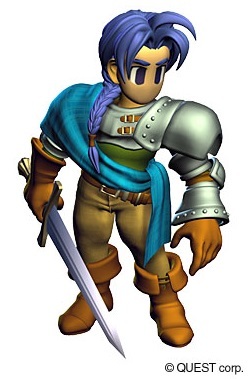
Tropes associated with Magnus:
- Asskicking Leads to Leadership: Eventually becomes general of the Revolutionary Army and possibly King of Palatinus in the best ending because he's such a fantastic fighter. Discussed in the bad ending, where it's brought up that Magnus' ability to win battles doesn't necessarily make him a good leader, or even a good person.
- Braids of Barbarism: He has a braid after the ancient Indigan tradition. Since the ruling class of Palatinus is mostly Auric, Indigan braids are seen as a sign of rebellion among the youth.
- Calling the Old Man Out: Does this to his father, Ankiseth.
- Chaste Hero: Magnus expresses no romantic interest in any of the female characters throughout the story, but he's not quite a Celibate Hero because he does have a son in the High Chaos Frame ending.
- Contemplate Our Navels: Tends to reflect a lot on whether what he's doing is right.
- Cool, but Inefficient: Come Chapter Four, Magnus trades in his Magic+ ability in the back row for elemental "blasts". While blasts certainly look cool and are unique to Magnus, since they only hit a single opponent they are much weaker and less versatile than the Magic+ he had in Chapter Three.
- Defector from Decadence: Very early on, Magnus decides he can't ignore the corruption of the Palatinean government and joins the Revolutionary Army.
- The Face: As the Revolution's youngest commander and greatest warrior (and the main character), he is at the forefront of the Revolution. In Chapter Three he's seen introducing recruits from the Western Division to Frederick and Xevec.
- Fantastically Indifferent: Throughout the story, Magnus runs up against demons, gorgons, and a demigoddess, and he talks as casually and politely with each as he would a normal person.
- Fashionable Asymmetry: In his initial outfit.
- Four-Star Badass: Starts out as a rookie but is eventually promoted to full commander of the Revolutionary Army. He's never shown making battle plans or displaying any strategic or tactical thinking, though, which means he's more of a...
- Frontline General: Participates in every battle he fights. His skill in battle may be the cause of his Popularity Power.
- The Good King: In the high Chaos Frame ending.
- Heroes Prefer Swords: Uses one-handed swords.
- The Hero: The player character.
- Jack of All Stats: As one might expect for a main character, Magnus is strong, fast, tough, and good at magic, but not the best in any of those areas. Still, he's better in all those categories than basically everyone but specialists.
- Magic Knight: After his class change in Chapter Three. Downplayed in Chapter Four, when he swaps his Magic+ ability for blasts.
- The Main Characters Do Everything: It seems Magnus' battalion is the only part of the ever-growing Revolutionary Army that does any actual fighting.
- Meaningful Name: His last name is "Gallant," which is a synonym for "brave."
- Number Two: To Frederick. Becomes Number One in the best ending.
- Popularity Power: Invoked in-universe if you lose to Destin in the secret final level. As Magnus is the general of the army and the man who led the Revolution to victory, his soldiers would oust Frederick for him if he returned to the capital.
- Sensitive Guy and Manly Man: The manly man to Yumil's sensitive. Magnus even points this out as a kid.
- Took a Level in Badass: Grows more confident as the story goes on, as well as becoming a better fighter. This is reflected in his class changing to a "Vanguard" in Chapter Three and again into a heavy armor-wearing "General" in Chapter Four.
- Trauma Conga Line: Hoo boy, does Magnus have it in for him if you make all the "bad" decisions in the story. Loses his father, closest military friend, and childhood best friend; gets betrayed by his mentor; cast out by his own army as possessed; and then sees the kingdom he fought to free entirely destroyed.
- Visible Silence: Though he just as often doesn't know when to shut up.
- Weapon Across the Shoulder: How he fights, though it's more "Blade Across The Back."
Diomedes Rangue/Dio
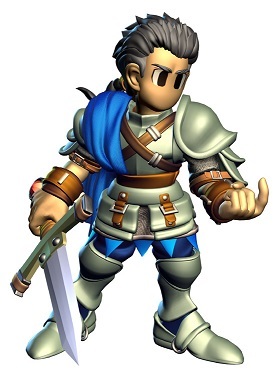
Tropes associated with Dio:
- Braids of Barbarism: Like Magnus, he has an Indigan braid.
- Chekhov's Gunman: If he leaves your party. He's assumed dead. He randomly shows up in a cutscene after a mission later on, unseen by the characters. He kills Rhade and takes his place as knight of the Central Division.
- Expy: Of Vyce from Tactics Ogre. Very similar appearance, with the same final class - which no other characters have access to.
- Face–Heel Turn: If he leaves your party.
- Fantastic Racism: the target of it due to his southern origin.
- Hot-Blooded: He challenges Magnus to a fight the very first time he meets him, but his temper is also seen while meeting Hugo and Leia.
- Interclass Friendship: With Magnus and Leia.
- The Lancer: Is not happy (at first) about playing second fiddle to Magnus.
- Magic Knight: Only after his class change, and still less so than most afterwards.
- "Reason You Suck" Speech/Shut Up, Hannibal!: Gives an awesome one to Rhade if you bring him to the boss fight in Mount Ithaca.
- Self-Made Man: Alone of the main cast, Dio comes from a poor background, and he's sensitive about it. He has a life ambition of becoming a knight and escaping his low-class birth. He eventually succeeds no matter what, though if you lose him, it's by joining the Central Division.
- Tragic Villain: If he leaves your party, his death in Chapter Four is very heartbreaking.
- Undying Loyalty: To Magnus, if Magnus refuses to fight him in Chapter One and says "I can't do it" at the execution."Alright! Magnus, I'm with ya!"
Leia Silvis
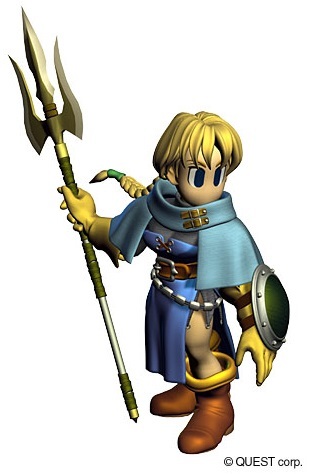
Tropes associated with Leia:
- Action Girl: Likely the first the player will see. Can fight competently both on the frontlines or with magic in the back.
- A Day in the Limelight: The battle at Argent, her home. She worries about having to potentially fight her father, and depending on player choice, she either learns he's already dead or has her worst fears come true.
- Amazon Brigade: Comes with her own all-female squad.
- Blow You Away/Shock and Awe: Uses wind element spells.
- Braids of Action: She wears a long single braid, though it's unclear if this is meant to be an Indigan braid like Magnus and Dio's or is just done for practical purposes.
- Deadpan Snarker: The snarkiest of the three.
- Jumped at the Call: In addition to joining the military, Leia also hopes and asks for special assignments from time to time.
- Lady of War: Is a prominent nobleman's daughter and chose a military life.
- Magic Knight: Able to cast spells in the back row, with her ability getting upgraded in Chapter Three.
- The Not-Love Interest: Another surprising aversion. Despite being one of the most prominent female characters in the story, she isn't explicitly paired up with anyone by the end of the game. Besides a brief moment of insecurity when she's worried about possibly having to fight her father, her relationship with Magnus and the others is always platonic and usually professional.
- Spirited Young Lady: Left the life of the upper class to join the army, and absolutely refuses to go back.
- Undying Loyalty: To Magnus. Unlike Dio, who may not join the Revolutionary Army under certain circumstances, Leia always will."You're our commander, remember? Com. Man. Der! We're supposed to follow you, no matter what!"
Hugo Miller
An adviser for the Southern Division. He is assigned to train both Magnus and Dio, and stays with the battalion afterwards. Follows Magnus to the Revolutionary Army.Tropes associated with Hugo:
-
 Annoying Video Game Helper: Downplayed. Some of his comments given in-battle come off as this, like warning the player of Yumil's Forbidden Spell about an hour of playtime before it actually goes off.
Annoying Video Game Helper: Downplayed. Some of his comments given in-battle come off as this, like warning the player of Yumil's Forbidden Spell about an hour of playtime before it actually goes off. - Anti-Frustration Features: Provides some in-universe for Magnus, such as disbanding his legions for him while preparing for sieges.
- Awesome by Analysis: There are a few times in the story where the Blue Knights are ambushed or something completely unexpected happens, but each time Hugo keeps a calm head, reads the situation, and works out some kind of a plan.
- Braids of Barbarism: Has an Indigan braid, just like Magnus and Dio.
- Brutal Honesty: To Dio."You'll eventually understand your shortcomings."
- Captain Obvious: Gives out such pearls of wisdom as "We should look out for enemy troops" or "We need to capture their base."
- Feeling Their Age: Says so after the Blue Knights rescue Frederick:"That was too much excitement for an old guy like myself."
- Intergenerational Friendship:
- He and Magnus are not often separated. In fact, Hugo is the one character who will be by Magnus' side the entire game regardless of playthrough. Even on low Chaos Frame routes, when even Destin goes against Magnus.
- His friendship with Ankiseth, over 20 years younger than him, means Hugo has been buddies with multiple generations of the Gallant family. Hugo and Ankiseth fought together and were close enough that Hugo knows the truth behind Ankiseth's "murder" of a nobleman.
- Mentor Archetype: Old, bearded, uses a staff, encountered early in the story. He spends a lot of time either teaching Magnus or being a soundingboard for Magnus's musings.
- Mentor Occupational Hazard: Subverted. Hugo makes it through the entire game without getting so much as a scratch.
- Mission Control: Hugo gives a briefing before every level of the game.
- Mr. Exposition: Between mission briefings, cutscenes, and the Hugo Report, you're gonna hear a lot of information from him.
- Retired Badass: Served with Ankiseth years ago, before retiring to become a tactician.
- Secret-Keeper: For Ankiseth. Though he presumably knows Procus sent the assassin Ankiseth killed, he allows Ankiseth to be the one to tell Magnus this.
- Secret Test of Character: Pulls one on both Magnus and Dio. He uses their first interviews with him to decide who should be given field command; since Magnus is polite and Dio is disrespectful, Hugo puts Magnus in charge.
- The Smart Guy: Magnus is the commander of the Blue Knights and an excellent fighter, but Hugo is the one coming up with all the battle plans.
Troi Tyton

Tropes associated with Troi:
- Cheerful Child: A good-natured, jolly person even in battle. If he's still around in Chapter Three when the Revolutionary Army learns of Lodis' invasion, he briefly loses his happy attitude, showing just how serious the situation's become.
- Momma's Boy: Part of the reason he joins Magnus, to grow out of it. Won't stop him from accepting a magical shield from his mom, though.
- Ship Tease: With Katreda. It's implied they're a couple in the high- and neutral-Chaos Frame endings if you have both.
- Stone Wall: Starts as a Phalanx. If you go see his mother, she gives him a shield that boosts his already impressive defenses and makes him immune to several magic effects.
- Tagalong Kid: Is one of the youngest characters in the story.
Katreda Birall

Tropes associated with Katreda:
- Neutral Female: Downplayed. Should the player have recruited Troi, Asnabel, or both, come the good or neutral endings Katreda stays home while they go off to war. Subverted if Troi or Asnabel weren't recruited, in which case Katreda decides she has to go help Magnus.
- Pink Means Feminine: Wears a bright pink robe.
- Ship Tease: With Troi. It's implied they're a couple in the high- and neutral-Chaos Frame endings if you have both.
- Useless Item: Her Angel Brooch, which maybe prevents the wielder from becoming a zombie if killed but is otherwise useless besides selling for Goth.
- Staff Chick: She's a classic staff-wielding healer.
- White Mage: Is a Cleric, so her magic heals.
Asnabel Birall
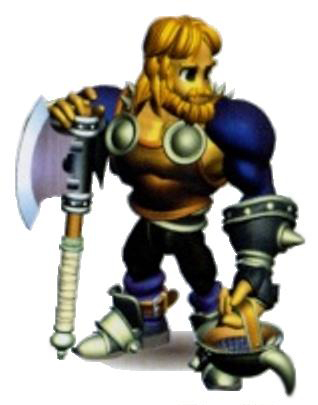
Tropes associated with Asnabel:
- Cool Helmet: His Helm of the Fearless.
- Cool Old Guy: Not THAT old, but old enough to know Ankiseth and Hugo personally and have fought alongside them.
- Good Parents: To Katreda. He won't join the Revolutionary Army unless he knows Katreda is safe.
- Hope Bringer: Several of his fellow prisoners in Gunther mine say they were only able to keep going because of Asnabel's optimism and encouragement.
- Purple Is Powerful: His default appearance is a purple Berserker, and he'll definitely be your strongest melee fighter for a good portion of the game.
- Recruitment by Rescue: The Revolutionary Army hopes to get his help by liberating the mines where he's imprisoned, but he'll only actually join if they got Katreda's help to do so.
- Red Baron: "The Iron Hammer."
- Screw the Rules, I'm Doing What's Right!: Hugo says Asnabel would've been a high-ranking member of the Central Division if he'd been more willing to kiss up to people. He's made to do prison labor at the Gunther Mines because he supported the rebellion as well.
- Working-Class Hero: Though an Auric, Asnabel is not an aristocrat and says he is fighting for the people of Palatinus. He even has a special dialogue with Procus where he explains the common people are not the slaves of the king.
Liedel Klein

Tropes associated with Liedel:
- Action Girl: As an Archer, she can do a lot of damage to the enemy back row.
- All Girls Want Bad Boys: Implied in the Neutral or Good endings, since she becomes a couple with Biske if you have him.
- Defeat Means Friendship/Defector from Decadence: If your Chaos Frame is high enough.
- Expy: Special archer? Red color scheme? Is a Chapter Two character who wants revenge against the main character for something he supposedly did in Chapter One? Only joins under certain conditions? Yep, in many ways she's like Aloser/Arycelle of Let Us Cling Together.
- First-Name Basis: When getting her Red Branch special item, it's shown Liedel knows her former Red Branch companions well enough to call them by their first name.
- Guide Dang It!: It's easy for first-time players to miss her, as she is the first special character with a Chaos Frame requirement.
- Lady of War: As an archer, she wears no armor but instead a red outfit.
- Last of Her Kind: Was the only member of the Red Branch to survive the surprise attack by ogres.
- My Name Is Inigo Montoya/You Killed My Father/Prepare to Die: Greets the Blue Knights by introducing herself, saying what they did to anger her, and what she's going to do about it.
- People of Hair Color: Is an Auric. Unlike many special characters, Liedel's motivation joining the Revolutionary Army is specifically to break down Palatinus' race-based class system."I'd rather live in a world where hair and skin color are insignificant."
- Red Is Heroic: Wears a vivid red outfit, which is your first hint she might be recruitable.
- Still Wearing the Old Colors: Her distinct clothes are probably the uniform she wore in the Red Branch and her way of remembering and honoring them.
Vad Orok Zlenka

Tropes associated with Vad:
- Fragile Speedster: With his special Idaten's Mail on, will likely be the fastest character in the game, though he doesn't have a lot of health.
- Guide Dang It!: While he doesn't have a Chaos Frame requirement like some others, besides his unique portrait there's nothing to indicate to the player he's a potential recruit. Many players will end up killing him and never knowing he could've easily joined their side.
- It's Personal: With Lodis, more than perhaps any other character. Vad tends to have words for stage bosses who are Templar.
- My Greatest Failure: Vad realized Lodis was turning the princes of Nirdam against each other but was helpless to stop it. It was because of this internal bickering that Nirdam fell so easily to Lodis. He is determined not to let this happen to Palatinus.
- Proud Warrior Race Guy: Takes great pride in his Nirdamese heritage and his loyalty to his king.
- Slave Mook: As a member of a Slave Race, starts out as one of these. The player can help him out of it.
- Token Minority: The only named human in the game that isn't white.
- Warrior Monk: The warriors of Nirdam are specifically trained in martial arts."My body is my greatest weapon!"
- Wolverine Claws: His weapon of choice. Specifically, his default weapon is the Touelno, a lightning-element claw.
Sheen Cocteau

Tropes associated with Sheen:
- Chivalrous Pervert: If the player sends a female character to recruit him, he'll flirt with her during the conversation. Some conversations with townsfolk implies he'll hit on just about any pretty female he comes across.
- The Jailbait Wait: Implied. In the stronghold of Frattelli in the Azure Plains, the player can meet a young girl who Sheen said he'd return and visit in a few years; there is another young girl in Dardunelles who gives Sheen the Decoy Cap. Whether or not he's serious isn't clear, but presumably he's waiting for them to grow up a bit, knowing that as a Hawkman he'll still look young, despite being 70 years older.
- No Challenge Equals No Satisfaction: Despite his carefree nature, Sheen mentions during the battle at Tybell that he doesn't want life to be too easy: overcoming trials is what makes fun meaningful.
- Older Than They Look: Hawkmen live much longer than humans. The Hugo report lists him as being in his eighties. He looks about thirty.
- Plucky Comic Relief: Everything from his intro scene to his in-game quotes (like how he wakes up when fully-rested.)
- Screw This, I'm Outta Here: Considers returning to Lodis in the neutral and high Chaos Frame endings. He either persuades himself to stay or gets talked out of it by Paul and/or Carth, if you have them.
- Shut Up, Hannibal!: Gives one to Frohm, of all people.
- Winged Humanoid: Has wings coming out his back.
Ankiseth Gallant
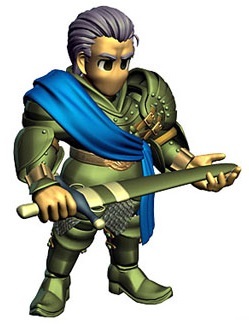
Tropes associated with Ankiseth:
- The Ace: Former general of Palatinus, the man who captured Biske, and a formidable enough warrior that even past his prime, people like Baldwin would rather stab him in the back than risk facing him in fair combat. Fittingly, he is one of the most powerful fighters in the game.
- Badass Teacher: To Yumil, especially when Yumil's made general of the Western Division.
- Calling the Old Man Out: Inverted, as Ankiseth will spend most of Chapter 2 calling his son out on joining the rebellion. Played straight at the end, where Magnus calls him out on never fighting the accusations of being a murderer. (As it turns out, Ankiseth had his reasons.)
- Climax Boss: If you choose to follow orders, Ankiseth is the final boss of Chapter Two.
- Cool Old Guy: From the moment you first see him, when he cuts down an assassin who's trying to kill a young Yumil.
- The Dragon: To Yumil, during Chapter Two. Yumil is technically in command but Ankiseth is both the fighting skill and military know-how of the operation. People only listen to Yumil because Ankiseth listens to Yumil.
- Dying Declaration of Love: If you follow orders, his last words are telling Magnus he loves him more than anything.
- Face Death with Dignity: Should he die at Baldwin's hands, he goes without fear. If he goes back to Yumil in Chapter Three, his death comes too quickly for him to really react.
- Four-Star Badass: Was originally general of the Central Division before his demotion, and one of the best fighters in the story.
- Hero with Bad Publicity: Zigzagged and discussed. Ankiseth was well-respected throughout Palatinus but his apparent murder of a nobleman stained his otherwise spotless reputation. He's mocked and distrusted by many nobles (such as Rhade and Godeslas), but it appears he's still held in high esteem in many places outside the Central Division.
- The Kingslayer: If he goes back to Yumil in Chapter Three, he ends up killing Procus.
- Magic Knight: Can use the Clay Assault combination spell in the back row.
- Mighty Glacier: When it comes to physical combat, only Biske's werewolf form and possibly Destin can really match him, but both are faster.
- My Country, Right or Wrong: Ankiseth checks off a lot of boxes typical to this trope, but eventually subverts it. While he is an antagonist to the Revolutionary Army at first, his loyalty to the current regime only goes so far.
- Never Got to Say Goodbye: According to Magnus, Ankiseth left his wife before Magnus went to the military academy, though the circumstances are unknown. If you follow orders, Ankiseth asks Magnus if Magnus' mother ever resented him for not telling the truth about his "murder". Magnus replies she loved him to the end.
- Officer and a Gentleman: An impeccable military man. As for the "gentleman" part, Ankiseth (and consequently Magnus) is the only Indigan in the story who is upper-class; presumably either his war record promoted him, he married an Auric noblewoman, or perhaps a mix of both.
- Parental Substitute: To Yumil, whom he advises and protects even from his real father.
- Screw the Rules, I'm Doing What's Right!: Saved Yumil's life as a child despite it causing him to lose his rank and going against the will of the king. Also happens later on when he wants to stop the fighting between the Revolutionary Army and Western Division.
- Secret-Keeper: Played with. Ankiseth is called "The Murderer" because he supposedly killed a nobleman in cold blood. Actually, the nobleman was trying to kill Yumil and Ankiseth was just doing his job protecting the prince. So why's Ankiseth never said this? Because the assassin was sent by the king himself. Since Ankiseth's kept his mouth shut, he's been able to keep his position and still protect Yumil.
- Sympathy for the Devil: Even when explaining to Magnus the truth about the assassination attempt, and even with how the event damaged his life, Ankiseth is careful to explain the king wasn't in his right mind at the time when he ordered the hit on his own son.
- "Well Done, Son" Guy: Him and Magnus have a difficult relationship to say the least, and Ankiseth is a man of few compliments.
- You Have Outlived Your Usefulness: Has this done to him by Yumil if the player chooses to cooperate with Ankiseth in Chapter Two, but refuses to let him join the Revolutionary Army in Chapter Three.
Meredia O'Kiefe
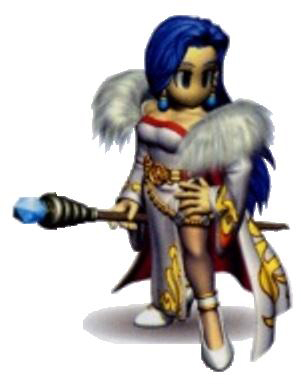
Tropes associated with Meredia:
- Ambiguously Absent Parent: It's not explained what happened to her parents, or why Count Silvis chose to raise her.
- An Ice Person: As a Water element, she naturally tends toward this. Bonus points for coming from the Tundra of Argent.
- Best Friend: Implied to be one with Liedel in the neutral and high Chaos Frame endings, provided you don't have Biske.
- Happily Adopted: Considers Count Silvis her real father, and his adopting her means she and Leia are foster siblings. They certainly act like sisters, though Leia finds her embarrassing at times.
- Hot Witch: Not technically a witch, but still fulfills this trope.
- Lady of Black Magic: Albeit a very bubbly one.
- Meaningful Name: "O'Keefe" means "kind" or "gentle."
- Ms. Fanservice: As a Siren, is probably the closest Person of Lordly Caliber gets to this, with long flowing hair, a low-cut slit-to-the-thigh dress, and a flirtatious personality.
- Nice to the Waiter: While getting the Rai's Tear accessory, Meredia gets hit on by an older man. She's inwardly creeped out but is friendly to him anyway.
- The Pollyanna: Played straight and invoked. Meredia is the single happiest and most friendly character in the story and has been this way since childhood, but she explains to Reucharle that once she had this pointed out to her by Count Silvis, she deliberately tried to make everyone around her as happy as possible.
- Pretty in Mink: Like all Sirens, she wears a fur coat, though hers is white.
- Say It with Hearts: Many of her sentences end like this.
- The Tease: Implied to be one with the player/Magnus, should you try to change her name on the Organize Screen:"You can change my family name to yours, if you'd like..."
Europea Rheda
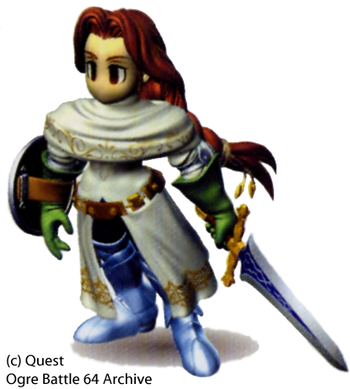
Tropes associated with Europea:
- Action Girl: And the only female special character to use a sword, to boot. Comes with Braids of Action.
- Apologetic Attacker: When one of her Berthan Sentinels gets possessed and goes after Kerikov, Europea apologizes to her before killing her.
- Badass Normal: Implied. In her default class she's the only sword-using special character to not have or gain any magical abilities.
- Clear My Name: Is accused of consorting with devils by Kerikov and seeks to prove her and Odiron's innocence.
- Continuity Nod: Her appearance is nearly identical to that of the female protagonist in March of the Black Queen, though her backstory is different.
- Cosmic Motifs: Stars. Her name was given to her "by the stars", Odiron tells her to "follow her stars" when she joins the Blue Knights, and then there's her unique item, the Starry Sky.
- Lady of War: The only female special character exclusively suited for frontline combat, and wears a graceful white uniform.
- Luckily, My Shield Will Protect Me: Her unique item is the Starry Sky, one of the best shields in the game.
- Orphan's Plot Trinket: The Starry Sky, which was found with her as a baby.
- The Paladin: Not literally, but she is the commander of the Berthan Sentinels, fights to do the right thing even if it gets her in trouble politically, and is one of the most religious people in the game.
- Red Is Heroic: The only redhead in the game.
- Religious Bruiser: Is a devout member of the Eastern Orthodox Church and even takes the time to share her beliefs on Berthe to a boss:"God watches over everything. She does not exist for the benefit of any one person."
- Spin Attack: How she fights, complete with lovely braid-swinging animation.
- The Stoic: Almost always acts in a calm, dignified manner.
Biske La Varet

Tropes associated with Biske:
- Anti-Hero: Of all the recruitable characters Biske is the most morally grey. His more sympathetic qualities don't show up unless he joins the Revolutionary Army and even then he's still the most aggressive and fearsome of the heroes.
- Barbarian Longhair: His human form is clean-shaven with long blonde hair.
- Black-and-Grey Morality: A werewolf convict who fights demons.
- Blood Knight: More than any other special character."I'm itching for action!"
- Cool Sword: The Evil Blade, which he wields when in human form.
- Dark Is Not Evil: He may be frightening, but if he joins the Revolutionary Army he loyally fights to free Palatinus.
- Defector from Decadence: Biske was thrown into prison for fighting against the Central Division, though it's not specifically mentioned why or when. The time frame and circumstances of his capture match the revolt mentioned in the prologue if you linger on the title screen, where the Southern Region rebelled shortly after Palatinus surrendered to Lodis and was supported by the Eastern Orthodox Church.
- Gameplay and Story Segregation: Reveals to Ankiseth that while he was tortured almost to death every day by the Central Division, whenever he entered his werewolf form his body would heal. He does not display any kind of unique Healing Factor in-game.
- Godzilla Threshold: Considering his history and power set, the Central Division's decision to free Biske and send him after the Revolutionary Army anyway shows just how desperate they are by Chapter Three.
- Go Mad from the Isolation: Biske was able to handle the physical torture dished out to him by the Central Division due to his werewolf form. What really got to him was being in a pitch-black cell alone for years.
- Hero with Bad Publicity: Downplayed. Biske is feared by many because of his werewolf form and criminal record, but he seems well-liked and even trusted by the people of Capitrium.
- Lightning Bruiser: At night, nobody hits harder, and few are faster. During the day? Not so much.
- Meaningful Name: His name (and story) is a reference to Bisclavret
 , a French legend about a knight who gets trapped in wolf form.
, a French legend about a knight who gets trapped in wolf form. - Not So Stoic: Despite boasting about how powerful his curse makes him, a conversation with a cleric in Capitrium reveals Biske is actually insecure about being a werewolf. The nun reassures him that Freaky Is Cool.
- Power Perversion Potential: Should you have Meredia but not Liedel, when she and Biske talk in the neutral or good endings, Biske tauntingly invites her to his bedroom. (Meredia quietly but firmly refuses.) Hugo's response to Biske's comment implies Biske is using his wolf transformation for more than just combat.
- Ship Tease: With Liedel, in neutral or high Chaos Frame endings.
- Swapped Roles: Invoked by Biske if he fights Ankiseth, pointing out how the first time they fought, Biske was the rebel and Ankiseth worked for the Central Division, and now the positions are reversed.
- Wolf Man: Ogre Battle's take on a werewolf is a man who transforms every night into a muscular, bipedal wolf with blue hair.
Paul Lukische

Tropes associated with Paul:
- Blessed with Suck: He may be a special character, but he's still an Enchanter. Many players only get Paul so they can get a second Lich.
- Commonality Connection: Implied with Carth; should the player have him but not Sheen, he and Paul head off together into Lodis in the good or neutral endings. Both are asocial atoners with not much left to live for.
- Contrived Coincidence: Paul believes himself capable of summoning demons, but will never use this power while he's in your army and instead just sticks to using a doll. This would be a case of Gameplay and Story Segregation but Mylmurre explains Paul didn't summon her at all: he merely attempted to summon her at the same time she slipped through a "space-time curvature" which had opened up near him for completely unrelated reasons. Oh, and it was when his best friend happened to be nearby, too.
- Evil Is Not a Toy: It's not explained exactly why Paul was attempting to summon demons, but considering what happened when one did show up, he probably learned his lesson.
- Improbable Weapon User: Dolls, like every other Enchanter.
- Improvised Golems: As an Enchanter, he can magically animate dolls to attack his enemies.
- It's All My Fault: Since he apparently summoned the Gorgon who petrified his best friend.
- Pretty Boy: A slender young man with Mystical White Hair. A Gorgeous Gorgon in the Temple of Berthe even flirts with Paul before giving him the Robe of the Abyss special item.
- Wangst: In-universe, the only way to recruit him is to tell him his moping is this, snapping him out of it.
- You Killed My Father: The Gorgon who stoned Paul's best friend is actually Mylmurre, the boss of Barpheth. If you let Paul confront her, he'll remind her what she did and tell her to Prepare to Die.
Carth Forleizen

Tropes associated with Carth:
- Badass Cape: With a cross on it.
- Black Knight: His character class, though his armor is a bit more silvery than normal. He gets a unique sprite on the Organize Screen, too.
- Broken Pedestal: Was genuinely shocked to learn the true goal of the Caliginous Order was to get the power of the netherworld.
- Combat Pragmatist: Should you go to Latium before Ptia, Carth gets one of his valkyries to stab Amazeroth in the back while he's distracted, allowing Carth to easily cut him down with a single chop of his axe.
- Commonality Connection: Implied with Paul; should the player have him but not Sheen, he and Carth head off together into Lodis in the good or neutral endings. Both are asocial atoners with not much left to live for.
- Crisis of Faith: Learning the truth about his commanders made Carth doubt his beliefs, but by the time he talks to Magnus he's worked it out. His Empire may have done a lot of bad things, but to him those are a separate issue from his faith.
- Defector from Decadence: Turned against the Brigade of Radiant Cross when he saw its members succumbing to the Infernal Aura.
- Determinator: Fought his way out of the madness at the Temple of Berthe alone, against both demons and corrupted fellow Templar. The Revolutionary Army finally finds him in the woods of Ptia, outnumbered and exhausted, trying to take down Amazeroth.
- 11th-Hour Ranger: As the final recruitable character, shows up very late in the game.
- Gameplay and Story Segregation: Carth is a Knight Templar, but is represented in-game as a Black Knight.
- Guide Dang It!: Recruiting Carth requires a low Chaos Frame, no Zenobians, going to Ptia before Latium, finding him in the woods and having him survive to the end of the level. Whew!
- Incorruptible Pure Pureness: Is one of the few knights of Lodis to not succumb to the Infernal Aura, and can possibly join Magnus to fight against it. Subverted if the player goes to Ptia after liberating Latium, where he will have succumbed and replaces Amazeroth as the stage boss.
- Knight in Sour Armor: Started out as a Wide-Eyed Idealist, honestly believing the Caliginous Order's mission to be just. (Amazeroth points out to Carth that Stupid Good people like him make perfect soldiers.) Carth now realizes his country and people may be corrupt and oppressive, but he remains a devout believer of his faith and hopes to reform Lodis to live up to it, even though he expects he'll likely die trying.
- Magic Knight: Can cast basic-level spells in the back row.
- My Country, Right or Wrong: Depends. In the good or neutral endings, should you have Sheen you'll get a scene of Carth persuading him to stay and fight with Magnus. However, should the player not have Sheen, it's implied Carth decides to fight on Lodis' side against Magnus in the upcoming war.
- Overshadowed by Awesome: While a properly-equipped Carth is one of the most powerful melee characters in the game, many players don't consider him worth missing out on all five Zenobians.
- Religious Bruiser: It's his faith in Filarrh, the god of Lodisism, that keeps him from succumbing to the Infernal Aura. Even after joining the Revolutionary Army he still fights for Lord Lodis.
- Token Good Teammate: Carth is the only human from Lodis who's a good guy.
Frederick Raskin
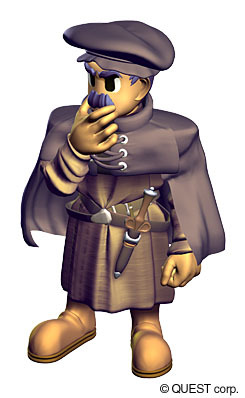
Tropes associated with Frederick:
- Cool Teacher: To Magnus, particularly helping him iron out what his ideals are.
- Dropped a Bridge on Him: Dies in battle shortly after becoming king.
- The Good King: Becomes King of Palatinus in all endings. As he never sat on the throne, he is known as "The Benevolent".
- The Idealist: So much so, that at least one group of the Revolutionary Army attempts a mutiny because they think Frederick's out of touch with reality.
- Informed Ability: Supposedly a warrior, but you never see him fight and he certainly doesn't look tough. In fact, the one time he's in a battle, he dies, in all the Chaos Frame endings.
- Out of Focus: In-universe Frederick is the man with the organizational skills to take a Ragtag Bunch of Misfits and make them into La Résistance, the diplomatic ability to gain foreign allies, and the rhetorical skill and goodness of character to keep the revolution from getting out of control. But since winning battles makes for more interesting gameplay than diplomacy and management skills, Frederick's contributions to his own revolution are overlooked in favor of focusing on Magnus kicking butt.
- Reasonable Authority Figure: Is pretty much nice to everyone. It's his kindness and courage in the face of death that finally gets Magnus to decide to join the revolution. In the neutral and high Chaos Frame endings, he's also known as a good and just king.
- Rebel Leader: The revolution was mainly just a group of angry-but-well-intentioned thugs until Frederick stepped in.
Xevec Nualton

Tropes associated with Xevec:
- Despair Event Horizon: Figures the Revolution is done for once he learns of Amrius' power.
- Face–Heel Turn: In most playthroughs, in Chapter Four Xevec will betray the Revolutionary Army, due to thinking Prince Amrius has gained the ultimate power and become unbeatable.
- Hufflepuff House: His Southern Tigers are presumably a big and influential enough fighting group to earn Xevec a spot at the top of the Revolutionary Army. They're never once seen in action. The only mention of them fighting is some skirmishes with the Central Division at the start of Chapter Four, right before Xevec betrays the Revolutionary Army.
- Killed Offscreen: If Dio leaves your party, Dio says that he killed him before he fights you at Fort Romulus.
- Out of Focus: He only has three scenes before his betrayal or death in Chapter Four.
- Silly Rabbit, Idealism Is for Kids!: He and Frederick go back and forth on this. With three regions of Palatinus to liberate and Lodis to fight off on top of that, Xevec believes any and all options to help the Revolutionary Army win must be used. This includes using the enslaved Bolmaukans.
- Token Evil Teammate: If sharing the same sprite as Rhade wasn't a big enough hint, he's by far the most aggressive member of the Revolutionary Army and the only one who regularly swears. He mainly exists to show how moderate and peaceable Frederick is by comparison.
Godeslas Branic
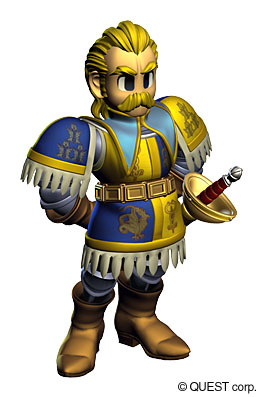
Tropes associated with Godeslas:
- Ambition Is Evil: His desire for power and his fear of failure define him, up to his dying breath."I will... ...reach... the... top..."
- Aristocrats Are Evil: Though not as blatantly nasty as Rhade, Godeslas is still a very selfish man, and in a pinch will sacrifice his own family to save his skin.
- Blessed with Suck: Baldwin comments that even the power-enhancing capabilities of the Infernal Aura couldn't do much with Godeslas.
- Climax Boss: The final opponent of Chapter One, though not a very tough one.
- Deal with the Devil: It doesn't work.
- Didn't Think This Through: Really, Godeslas. There's no way using that demon fruit is gonna backfire on you.
- Fair-Weather Mentor: Attempts to put on a fatherly air with Magnus after Magnus has won a few battles, though Rhade immediately understands Godeslas is only hoping to use Magnus' war record to get a promotion. Once Magnus joins the Revolutionary Army, Godeslas immediately denounces him.
- General Failure: Godeslas gets completely outmaneuvered by Frederick Raskin early on, only getting saved (temporarily) by the success of Magnus and his battalion. After he gets Ogres, he sends them after the Revolutionary Army and ends up killing his own reinforcements along the way.
- Informed Attribute: You don't learn he apparently had a wife and kids until after he's already sacrificed them to get Ogres.
- Never My Fault: Blames the Revolutionary Army for forcing him to make terrible decisions.
- Starter Villain: Though Rhade is more actively antagonistic to Magnus, Godeslas is the general of the Southern Division and, as such, commander of the forces the player's fighting in Chapter One. He's also the first character to interact with Baldwin, and introduces the ogre plotline.
Eurynome Rhade
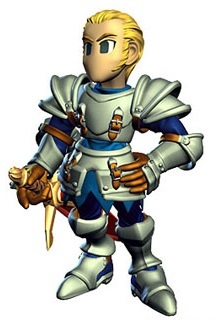
Tropes associated with Rhade:
- Authority Equals Asskicking: Stuck-up aristocrat he may be, but he still knows how to fight. At the beginning of the game, he easily dodges Magnus' punch and takes him down in one swift blow to the face. Later falls victim to Villain Forgot to Level Grind, though.
- Cluster F-Bomb: With every word but the "f", beginning with his literal first line.
- Fantastic Racism: To anyone not part of the nobility.
- Hate Sink: Has little or no redeeming qualities, mainly so the player won't feel bad betraying the Palatinean Army. Killing him in Chapter Two or seeing him get murdered by Dio is very satisfying." ...Don't forget. You're nothing but a piece of shit."
- It's All About Me: Never outright stated given that he doesn't have a lot of screen time, but he never shows any regard for anything but himself.
- Jerkass: Is he ever. Even Richard and Baldwin come off as benign compared to him.
- Kick the Dog: His introductory scene has him killing a peasant in cold blood, and his second scene has him kicking a prisoner in the face multiple times. It only gets worse from there.
- Nice Job Fixing It, Villain: If Rhade wasn't around to show Magnus just how corrupt the Palatinean nobility was, Magnus may never have joined the Revolutionary Army.
- Power-Up Letdown: By the time you finally get that cool-looking fire sword of his, you'll have plenty of weapons that're much better.
- Puzzle Boss: Downplayed. In the second fight with him, he's got two Paladins in the back row that constantly heal him. You don't have to attack him from behind in order to win, but it sure helps.
- Starter Villain: He's a pretty prominent character in the first two chapters of the game, but on the whole isn't that important politically, isn't that skilled of a warrior (relatively), and his actions and death don't have any major impact on the rest of the story.
- Ungrateful Bastard: After saving his life, he berates you for not being faster.
- You Rebel Scum!: Chews out the rebels saying they should just accept their lives as they are and that the upper-class deserves to live better off regardless of abuse of power.
Jeal Veritte
A high-ranking member of the Central Division.- Black Knight: His job class. He doesn't get any special distinguishing features from a regular Black Knight, though.
- The Generic Guy: He doesn't even get his own unique portrait in the Hugo Report.
- Kick the Dog: Have Liedel confront Jeal at Fair Heights and he'll reveal he knew it was Godeslas, not the Blue Knights, who summoned the Ogres which wiped out the Red Branch. He lied to Liedel about it anyway to motivate her against the Revolutionary Army.
- Magic Knight: Since he's positioned in the back row by default for his boss battle, he'll normally be attacking with spells.
- Red Oni, Blue Oni: Downplayed. He's the blue to Rhade's red, being more polite to Yumil, less aggressive to the lower class, and speaking less often. This is even reflected in their weapons, with Rhade using a red Sword of Firedrake and Jeal using a blue axe.
- Villain Forgot to Level Grind: Invokes this when he dies."It was a big mistake for us to have left the Blue Knights alone for this long... I should've taken care... of you... long ago......"
- Villain Respect: While not quite Affably Evil, Jeal is polite to Magnus when he fights him (at least compared to Rhade), and compliments him on how well he's done against the Central Division and Lodis.
- We Hardly Knew Ye: Shows up prominently in the prologue and is apparently high-ranking in the Central Division, but is never seen or mentioned again until his death in Chapter Three. Lampshaded by Jeal himself, who's honestly surprised Magnus still remembers who he is when they finally meet again.
Count Silvis

Tropes associated with Count Silvis:
- An Ice Person: Uses the "Ice Field" spell in combat and rules the Tundra of Argent.
- Ax-Crazy: If the player goes to Argent after liberating Latium.
- Early-Bird Cameo: Count Silvis—or at least somebody who shares the same sprite as him—appears in one of Magnus's flashbacks in Chapter One, as part of a crowd surrounding Ankiseth after he's killed a nobleman.
- Good Parents: Likely had a hand in raising Leia as one of the few morally good members of Palatinus' upper class. Their relationship is also not as strained as Magnus and Ankiseth's. Raised Meredia as well.
- Incorruptible Pure Pureness: If the player visits Argent before Winnea, they'll find out that Count Silvis has died rather than succumb to the Infernal Aura, and even beyond that he's such an honorable man the lich Reucharle can't bring him back as an undead. Subverted if the player visits Argent after taking Winnea, in which case Count Silvis has turned evil.
- Parental Substitute: Foster father to Meredia.
- Reasonable Authority Figure: Beloved by the land of Argent and secretly supportive of the revolution, which makes him the...
- Token Good Teammate: ...of the Central Division, which otherwise includes Godeslas, Rhade, Jeal, Kerikov, Amrius, and Procus.
- The Unseen: Unless you go to Latium before Argent.
Kerikov Barthes

Tropes associated with Kerikov:
- An Ice Person: Uses the "Ice Field" spell in combat, wields the water-element Peridot Sword, and is fought in the snowy land of Celesis.
- Butt-Monkey: Just look at his portrait, for starters. Kerikov spends most of his time onscreen getting bullied by other people and gets casually disintegrated in the low Chaos Frame ending.
- Dirty Coward: Does not want to fight, and runs away from the Blue Knights at the soonest opportunity.
- Frame-Up: Uses the power of the netherworld to possess a Berthan Sentinel and make her attack him, then accuses Archbishop Odiron of doing it, all so he could take Odiron's position.
- Hate Sink: He's like Godeslas, but even more of a sniveling, cowardly, pathetic, double-crossing loser. Everybody—Pruflas, Amrius, Magnus—hates Kerikov.
- The Mole: Was sent to the Eastern Orthodox Church by Procus and Amrius to find out about the Ultimate Power. Once there, he decides it would be more beneficial to use his position (and knowledge of Amrius' plans) to help Lodis.
- Opportunistic Bastard: Sells out Amrius to Lodis, then once Lodis abandons him, tries to get help from Amrius again. Once the Blue Knights beat him, sells out both Lodis and Amrius so the Blue Knights will spare him.
- The Quisling: Betrays his crown prince to Lodis, the Knight Templar foreign invaders.
- What Happened to the Mouse?: In most playthroughs, he slinks off-screen after the Blue Knights beat him and is never seen again. In the Low Chaos Frame Ending, though, he happens to run across a reincarnated Rashidi and gets brutally disintegrated.
Yumil Dulmare
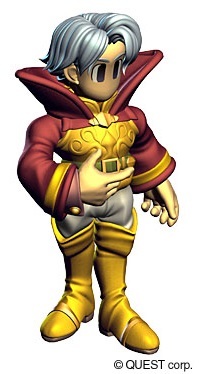
Tropes associated with Yumil:
- Authority in Name Only: Yumil's whole life is an attempt to escape this. Physically frail and soft-spoken, as well as being the second, hated son of a powerless king, few people take him seriously. Rhade ignores his order to spare Qad, and even his appointment as General of the Western Division is seen as a formality, since Ankiseth has both the muscle and the commanding experience. Should you follow orders at Wentinus, Ankiseth openly defies a direct order from Yumil and fights Magnus.
- Battle Aura: Gets surrounded by blue light whenever he's about to use his divine power.
- Big Bad Ensemble: Would qualify as the Big Bad if not for the fact that he gets killed shortly after becoming a villain.
- Bishōnen: Complete with silver hair.
- The Chosen One: The prophesied Child of the Covenant. Due to a bit of tampering by the Caliginous Order and a few other factors, he becomes The Poorly Chosen One, wanting to destroy the world.
- Face–Heel Turn: Though it's debatable how much of it was really his fault, what with getting force-fed a mind-altering demon fruit and all. To make it more complicated, how much of a turn it is can vary on playthrough:
- If you made peace with the Western Division, Yumil refers to himself as "King Yumil the Chosen," is more rude and unhinged, and fully intends on using the Forbidden Spell against everyone who defies him.
- If you followed orders to fight the Western Division, Yumil still refers to himself as "prince" and lets his father stay king (while he's alive), is more polite and reasonable, and refuses to use the Forbidden Spell against the Revolutionary Army. He comes off as more of a Well-Intentioned Extremist, planning to destroy the netherworlders, along with Winnea, and atone for the sins of the Royal Family. Any conflict between him and Magnus is more of a misunderstanding, and ultimately Zeda decides she'd be better off if he was dead and kills him herself.
- Fatal Flaw: Envy. From the time he was young he wanted to be strong like Magnus and Ankiseth, so that he wouldn't be helpless and could change the world for the better. This is coupled with a fear of loss; Yumil wants to be powerful enough that Magnus and Ankiseth can't leave him and will have to rely on him.
- Flunky Boss: Though most bosses in the game are this, Yumil gets special mention for having two (four, under certain conditions) very powerful Knights of Danika fighting alongside him.
- Forgotten Childhood Friend: Played with. He has a feeling he knew Mari, his lover, in his youth, but he didn't. Mari's father is Rashidi, who specifically manipulated the entire situation so that the two would meet.
- Gameplay and Story Segregation: In-universe, his "forbidden spell" is apparently able to kill every single person in the world who defies him, and his "ultimate power" should be unbeatable. In reality, all this means is he can cast the combination spell "Blue Spiral" by himself.
- God in Human Form: Actually the reincarnation of Danika, the daughter of Berthe, the Goddess of Earth.
- The Idealist: Has grand ideals of making a world of equality and peace.
- Lady and Knight: His dream is for him and Magnus to have a relationship similar to this.
- Morality Pet: He is this to Magnus, and later on, Magnus is this to him.
- Mr. Exposition: Gives a pretty big exposition dump in Chapter Four.
- Nice Guy: Is nice to most everyone (and especially the lower class), spends much of Chapter Two trying to stop the fighting between the Revolutionary Army and the Western Division, and wants to bring peace to the world.
- No-Respect Guy: Yumil spends most of the game getting ignored and bullied by the people under him.
- Orcus on His Throne: Justified. In Chapter Four, he's waiting for Magnus to come to him so Magnus doesn't get killed by his Forbidden Spell.
- Royal Rapier: Fights with a rapier in Chapter One. Later on he gets the Clau Solace, but you never see him use it in combat, and you
 can't get it yourself.
can't get it yourself. - Royalty Superpower: His blood can open Chaos Gates.
- Save the Princess: Inverted, since Yumil is male.
- Self-Made Orphan: Disintegrates Procus in Chapter Four.
- Sensitive Guy and Manly Man: The sensitive to Magnus's manly. Magnus even points this out as children.
- Spare to the Throne: Second son of Procus.
- To Hell and Back: Descends into the Netherworld at the end of Chapter Three. Comes back a Physical God in Chapter Four.
- The Unfavorite: Hated by his father, since his mother died in childbirth. Due to his odd hair and eye color, his father suspects he's not really his son anyway.
- Walking Spoiler: As you can tell by reading his entry, who Yumil is and what happens with him is pretty much the central plot of the game.
Mari Callan
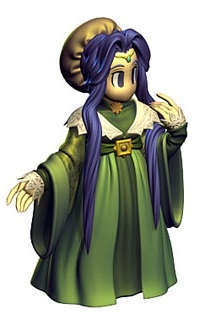
Tropes associated with Mari:
- The Dog Bites Back: After getting manipulated (and later mind-controlled) by Zeda for almost the entire game, once Zeda gives her The Reveal Mari has enough and runs Zeda through with her own sword.
- Idiot Ball: Happens twice in most playthroughs. First, Mari's fear of losing Yumil causes her to kill him. Secondly, after Zeda tells her she's been an Unwitting Pawn all along and orders her to stab and break the seal on Danika's prison, Mari decides to vent her frustration by randomly stabbing the ground, which is the seal on Danika's prison. The story only continues after the Revolutionary Army takes Winnea because of Mari.
- Informed Ability: Her magical powers, if you choose not to make peace with the Western Division in Chapter Two. Since Baldwin kidnaps Yumil from the throne room instead of his study in that story route, Mari will not be there to attack him, and that's the only time in the game where she uses her magic.
- Lady-In-Waiting: Is presented by Baldwin as a personal servant for Yumil, with the implication she's meant to be a Hot Consort.
- Lady of Black Magic: Not at first, but becomes one after getting her power unlocked by Zeda, and uses it to great effect against Baldwin in many playthroughs. Her magic comes from being the daughter of Rashidi, the Big Bad of the first Ogre Battle game.
- Lineage Comes from the Father: Gets her magical power from her father, Rashidi.
- Raised by Natives: Should you visit the town of Balera in Mt. Keryoleth the first time you go there, a villager will tell you Mari is apparently from there, having been adopted and raised by a commoner couple. It's unknown who her mother is, but her father Rashidi is not from Palatinus, but Zeteginea.
- Screw Destiny: Attempts to do this after Zeda gives her The Reveal, killing Zeda and refusing to release Danika. Doesn't work. Danika's released anyway, and Rashidi is still incarnated.
- Someone to Remember Him By: With Yumil, as seen in the Low Chaos Frame Ending. Unfortunately, her child is the reincarnation of Rashidi, the Big Bad of the Ogre Battle series.
- Strangled by the Red String / Token Romance: Downplayed, invoked, and justified. Yumil and Mari fall in love over the course of the story (a little more heavily on Mari's end), but basically all their onscreen interactions are either Yumil being upset, craving power, or going crazy; they never are shown getting to know each other or doing things together. This makes it seem like Yumil only likes Mari because she's good-looking, and Mari's love for Yumil is pure infatuation with no real basis. It all makes sense later on when it's revealed both Yumil and Mari have been manipulated by Rashidi to fall in love with each other, all so that Mari will get pregnant by Yumil when he's become The Chosen One, and give birth to a divine child Rashidi can then possess to obtain godlike power.
- Traumatic Superpower Awakening: Sure seems like it was, when Zeda awakens her hidden magical potential.
- Undying Loyalty: To Yumil, which Zeda exploits to manipulate her.
- Unwitting Pawn: Of Zeda, and by extension Rashidi.
- Violently Protective Girlfriend: She loves Yumil so much that if you try to take him away from her, she'll kill you. Even if you're Yumil!
Amrius Dulmare

Tropes associated with Amrius:
- A God Am I: In Chapter Four. His powers are truly impressive, but as it turns out, the real god was his younger brother Yumil.
- Asskicking Leads to Leadership: Invoked. Amrius believes strength makes a good king, which is part of the reason why he thinks his dad's a terrible one.
- Big Bad Wannabe: Is probably the most powerful villain present at the start of Chapter Four, but gets dealt with first out of all of them.
- Calling the Old Man Out: Despises his father as a coward, and gets after him when Procus wimps out in front of Richard.
- Four-Star Badass: Zigzagged. Is the general of the Central Division at the start of the game, but is still really wimpy. Played straight in Chapter Four.
- Fury-Fueled Foolishness: Amrius gets slowly more and more heated as Richard delivers his decree in Chapter Three. When Richard turns to leave, Amrius rushes the Death Templar with three bodyguards from behind with a sword. It goes as well as expected.
- Out-Gambitted: Tries to beat Lodis to the Ultimate Power. Not only does it not work, but the only reason he got as far as he did was because Lodis allowed it, just wanting to mess with him.
- Royal Brat: Implied. Later on he becomes The Evil Prince, mixed with The Caligula.
- Silly Rabbit, Idealism Is for Kids!: If Magnus or Europea confront Amrius at Fort Romulus, he counters their "Reason You Suck" Speech with two reasonable Motive Rants. For Europea, he'll point out that if his father hadn't focused as much on peace, art, and philosophy Palatinus wouldn't have been conquered. For Magnus, he talks about how good ideas alone won't save them from Lodis, saying Magnus knows this because it's his military success, not his goals, which have brought him this far."If you don't hold the power to realize the ideals, they remain as dreams! ...Reality emerges from battles, and strength is required to win battles!"
-
 That One Boss: One of the few bosses in the game that's actually dangerous, casting a Pedra of Bane against you twice per combat.
That One Boss: One of the few bosses in the game that's actually dangerous, casting a Pedra of Bane against you twice per combat. - Took a Level in Badass: Thanks to a little help from the Infernal Aura, goes from sniveling in the presence of the Knights Templar and unable to beat a single one of their Mooks, to apparently ordering Temple Commands and being one of the most powerful opponents the player will face.
- Warrior Prince: Fancies himself one, but even after getting a power boost from the Infernal Aura, he's still not a good fighter...when he's just using a sword.
Procus Dulmare

- A God Am I: Not to the extent of his son Amrius—for one thing, Yumil shows him pretty quick who's got the real divine power—but he has his moments.
- Abusive Parents: Absolutely despises his younger son Yumil. Even tried to assassinate him as a child.
- Cruel and Unusual Death: Gets disintegrated by Yumil. May also count as DeathByIrony, since the man who tried to kill his son as a child gets killed by that very same son.
- Didn't Think This Through: It seems in his hurry to kill his son Yumil Procus completely failed to consider Ankiseth, a skilled fighter absolutely dedicated to his bodyguard job who could and would thwart the attempt. Had Procus merely given Ankiseth a different assignment beforehand—or better yet, replaced him with the assassin—the plan probably would've gone off without a hitch. Then again, Procus wasn't exactly in his right mind when he ordered the hit anyway.
- Ermine Cape Effect: Wears an actual ermine cape, and is always seen in his royal regalia.
- Guide Dang It!: Many players don't know it's even possible to fight Procus, since it requires a low Chaos Frame (and generally, going straight to Latium in Chapter Four instead of liberating the rest of the Central Region.)
- God Save Us From The King: Comes to be known as "Procus the Mad" come Chapter Four.
- Ironic Echo: The beginning of Chapter Three sees Procus having a meeting in his study and getting interrupted by Richard, who takes away his authority. The beginning of Chapter Four sees Richard having a meeting in the same study and getting interrupted by Procus, now under the sway of the Infernal Aura, who takes it back.
- Know When to Fold 'Em: After the Kingdom of Nirdam decided to fight Lodis and got quickly defeated and enslaved, Procus decided to surrender when Lodis came to Palatinus. Because of this, he got to keep his crown and a lot of his power, as well as save many Palatinean lives and keep them from enslavement. However, he still wishes to become independent.
- Offing the Offspring: Sent an assassin to kill Yumil when his son was a young child. Thanks to Ankiseth, it didn't work.
- Pet the Dog: For what it's worth, Procus didn't seem too upset with Ankiseth for thwarting his attempt to kill Yumil. Other than an official demotion, he otherwise didn't imprison or punish Ankiseth (despite having no apparent reason not to do so in the public's eyes) and let him keep his upper-class status.
- Puppet King: Upon surrendering to Lodis, he became this. What power he had left gets taken away by Richard in Chapter Three.
- Took a Level in Badass: Though his magic isn't quite as powerful as Amrius', once he's been powered up by the Infernal Aura he can still cast the combination spell Lava Flow by himself.
- Unwitting Pawn: An offhand comment by Ankiseth in Chapter Two implies Procus was manipulated by Rashidi years before the start of the game.
- Yes-Man: Is one of these around Richard, who despises him all the more for it.
Archbishop Odiron
The head of the Eastern Orthodox Church.Tropes associated with Odiron:
- Cool Old Guy: The oldest cool old guy in the game.
- Early-Bird Cameo: Is literally the second character seen in the game after Magnus, but only gets mentioned again (and becomes plot-relevant) in Chapter Three.
- High Priest: Head of the local Berthan religion, which among other things means he's required to preside at military graduations.
- Mr. Exposition: Finally lays out what the "ultimate power" is, if it's more than a legend, and what this "Child of the Covenant" stuff means.
- Parental Substitute: Raised Europea.
- Pet the Dog: Almost literally: Biske's special item, the Jeulnelune, is stated to be a gift from Odiron.
- Player Personality Quiz: Gives one of these at the beginning of the game.
- Reasonable Authority Figure: Was well-loved by the Eastern Region, and helps out the Revolutionary Army once they finally meet him.
See Aisha, Saradin, Debonair, Destin, Gilbert, and Rashidi's entries in Ogre Battle: The March of the Black Queen.
Tropes associated with all the Zenobians:
- The Ace: Each of them are among the best of their type: Destin and Debonair for melee, Saradin for offensive magic, Aisha for support, and Gilbert...for training beasts.
- Badass Crew: Having literally beat this story's equivalent of Satan in their previous adventure, they aren't fazed easily.
- Badass Teacher: Destin, Saradin, and Debonair all have shades of this for Magnus, though Destin has more of a Big Brother Mentor flavor.
- Big Damn Heroes: Destin, Debonair, Aisha, and Saradin all first appear in the prologue, rescuing Qad. Destin and Gilbert later show up at the Temple of Berthe to stall Richard and Baldwin.
- Cutting Off the Branches: Their presence in Palatinus means the "World" ending of the previous game happened.
- Early-Bird Cameo: Those shadowy figures on the hill on the title screen? That's them.
- Famed In-Story: Implied. Throughout the game, many characters are referred to by generic terms like "warrior" or "old woman" before their names are dropped. By contrast, after the prologue the Zenobians are labelled by name despite never actually introducing themselves, indicating Magnus already knows who they are. Combined with how Richard the Dragonheart immediately recognizes Destin as the man who defeated the Zeteginean Empire despite never meeting him before, it appears their deeds are famous. May overlap with Legendary in the Sequel.
- Guide Dang It!: Debonair (and consequently Destin and Gilbert) can be easy to miss, even if you fulfill all the requirements to get him.
- Hero Antagonist: For about half of Chapter One they are enemies of Magnus before he joins the Revolutionary Army. They reprise this role in a low Chaos Frame story under certain conditions.
- Knight Errant: Though they already liberated their own land, instead of staying home they've come to Palatinus to help other oppressed people become free as well.
- Stealth Hi/Bye: Somewhat downplayed as from the third person view the player has, they can see Destin sneak up on Jeal and tap him on the shoulder.
- Shut Up, Hannibal!: Debonair delivers one to Rhade as he interrupts his attempt to execute Qad."...You call yourself a knight? [...] Or do all knights in this land devour helpless souls?"
- The Magnificent: Debonair retains his "Of the Wind" from the original game. Destin is repeatedly referred to as "Destin the Valiant" while Saradin gets "Saradin the Warlock".
- True Companions: Came from a wide variety of backgrounds (and some even fought against each other at points), but they are all now loyal and tested friends.
The Temple Commands
High-ranking commanders of the Caliginous Order. Include Pruflas Watts, Vapula Simberg, and Amazeroth Ludon.- A God Am I: Amazeroth and Vapula, due to the Infernal Aura.
- All There in the Manual: Both Vapula and Amazeroth have Hugo Report entries that describe them in more detail (such as Amazeroth being a "quiet man"), but since you only see them when they've succumbed to the Infernal Aura, you never actually see these parts of their personalities.
- Arc Villain: Pruflas, the one with the most screentime and development, is the primary antagonist of Chapter Three. The Blue Knights are trying to beat him to the Temple of Berthe.
- Ax-Crazy: Amazeroth and Vapula have become this by the time you first see them. Downplayed in Amazeroth's case if the player visits Winnea before going to Ptia. He's still succumbed to the Infernal Aura to some extent because he turned on Baldwin and Richard earlier, but Carth has as well, and Amazeroth tells him this before getting killed.
- Bloodlust: A Paladin at Blue Basilica says Vapula was lurking in the castle there after succumbing to the Infernal Aura, feeding on human blood.
- Cool Sword: All of them have the strongest sword of their element: the Adamant Katana for Pruflas (Earth), the Laeveteinn for Amazeroth (Fire), and the Nephrite Sword for Vapula (Water).
- Evil Feels Good: Both Amazeroth and Vapula enjoy being Ax-Crazy.
- Face–Heel Turn: Or a Heel-Heel turn for Vapula. He worked for Debonair while he was still a Deva of Zeteginea, but left before Debonair joined Destin's revolution.
- Hiding Your Heritage: Vapula is described only as "a nomadic knight." The truth that he was originally from Zeteginea before joining the Caliginous Order is only revealed if Debonair confronts him.
- Loophole Abuse: Vapula justifies his desertion of the Zeteginean Empire by saying he never swore an oath to serve them like Debonair did.
- Magic Knight: Can use the Evocation spell if they're in the back row.
- Manipulative Bastard: Seems like a common trait: Pruflas takes advantage of Kerikov, while Amazeroth gleefully admits he used Carth and others."People like you make perfect soldiers. You're loyal to the death. What more can we ask for?"
- Moving the Goalposts: Pruflas does this to Kerikov, changing the deal from getting information to a suicide mission against the Blue Knights.
- Only the Worthy May Pass: Pruflas does his best to open the seal at the Temple of Berthe without Yumil, but he can't get it to work.
- We Hardly Knew Ye: Vapula and Amazeroth have Hugo Report entries, but neither appear or are mentioned before Chapter Four, and are only seen twice each before getting killed. Neither has lines in their first appearance. Especially glaring for Vapula, who is a former comrade of Debonair's.
- You ALL Look Familiar: All three share the same sprite, regardless of the hair color their portrait has.
- You Got Guts: Pruflas says this to Amrius when shutting down the latter's "find the ultimate power and use it to beat Lodis" scheme.
Baldwin Glendale
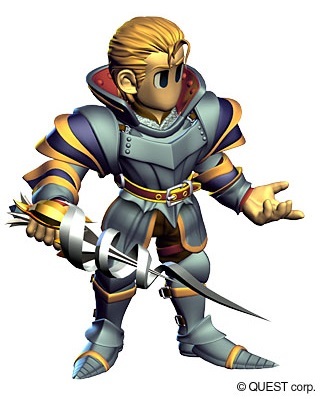
Tropes associated with Baldwin:
- Bitch Slap: Does this to Mari if you disobey orders at the end of Chapter Two—so hard it knocks her across the room!
- Cain and Abel: Has a strained relationship with his older brother Richard. He tries to earn his approval while Richard treats him like dirt, but secretly care about him. Eventually Baldwin has enough and kills him right before Danika's revival, hoping to take whatever power he can from her for himself.
- Chronic Backstabbing Disorder: Ends up betraying or abandoning Godeslas, Rhade, Yumil, and even his own brother Richard. Also literally stabs Ankiseth in the back in one route.
- Combat Pragmatist: Has shades of this.
- When surprised by Mari's magic, he knocks her out before she can cast a second spell.
- In some routes, he stabs Ankiseth in the back, knowing he'd be difficult to defeat in a straight fight.
- The final time you fight him, he hides behind an Ogre.
- Cool Sword: His Anbicion, which you sadly never get.
- Dark and Troubled Past: Baldwin's father was betrayed and killed during a power shift in Lodis many years back. Both Baldwin and Richard desire to avenge their father and restore his legacy, but Baldwin seems much more bitter and nasty about it.
- Disc-One Final Boss: And then he comes back. Twice. And he's still not dead after the third battle.
- The Dragon: To Richard. Later becomes a Dragon Ascendant when he offs Richard.
- Easily Forgiven: Punches out and kidnaps Yumil in Chapter Two (and in some playthroughs, doing this right after he kills Ankiseth), yet Yumil doesn't mention this at all when they next talk in Chapter Three.
- The Heavy: Is the most frequently fought character in the game, appears as early as Chapter One, and shows up frequently after that, all the way until the final level. Most of the Caliginous Order's schemes are carried out by him, and he has something to do with just about every bad thing that happens in the story.
- Irony: In order to gain the ultimate power, he spends the whole game trying to meet Danika. He finally does...and she promptly kills him.
- It's Personal with the Dragon: Baldwin encounters the heroes more often than Richard does, so Magnus (and the player) has more reason to want to see him get taken down. Especially in routes where he kills Ankiseth.
- Kill the God: He plans to do this to Danika after getting her blessing. It doesn't work.
- Lightning Bruiser: Baldwin hits hard, but he's notably less of a tank than the other Knights of Lodis and dodges attacks instead of blocking them.
- Magic Knight: In his final battle, he uses a powerful Evocation spell.
- Manipulative Bastard: Is this to Godeslas, Rhade, and Yumil, and to a lesser extent Mari, Ankiseth, and Zeda.
- Obviously Evil: How the huge, menacing man in dark armor manages to get the trust of anyone is a mystery for the ages.
- Pet the Dog: He seems to genuinely care about Thamuz and gets very upset when Thamuz is killed.
- Villain: Exit, Stage Left: Teleports away from battle at least three times during the story, often four.
Thamuz Delville
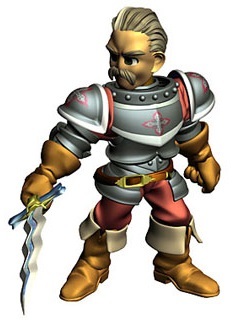
Tropes associated with Thamuz:
- Combat Pragmatist: Implied. He's one of the few bosses in the game who shields himself from direct attack in his group formation.
- Cool Old Guy: Other than the fact he's working for the Caliginous Order and has no problem helping them seek power from the netherworld, he seems a pretty decent, honorable guy.
- Cool Sword: His Peridot Sword.
- Expy: Of Balzepho from Tactics Ogre, as the older mustached Temple Command advisor to the resident Death Templar.
- Lightning Bruiser: Like Baldwin, Thamuz dodges attacks instead of blocking them.
- Morality Pet: To both Glendale brothers, but particularly Baldwin. He's the only person they're always polite to, and they both ask and listen to his advice.
Richard Glendale
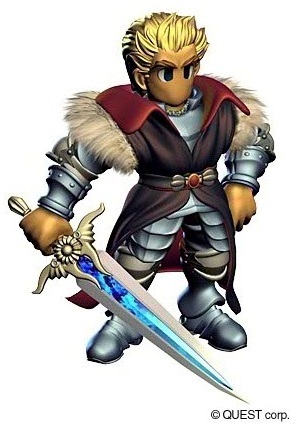
Tropes associated with Richard:
- The Ace: One of the best warriors in all of Lodis, the Always Someone Better to Baldwin, and able to go head-to-head with Destin.
- Aloof Big Brother: He's shown to care about Baldwin, but never shows it around him and is extremely cold towards him in hopes of pushing him to work harder. This treatment eventually leads to Baldwin killing him, and Richard is actually proud of him for it.
- Authority Equals Asskicking: As a Death Templar, he's stronger than any other knight of Lodis and is in the competition for most powerful physical fighter in the game.
- Big Bad Ensemble: Is the de-facto ruler of Palatinus and would have served as the game's Big Bad if not for the fact that Amrius and Procus become more powerful than him in Chapter Four, and then he gets usurped as a threat by Yumil before making a last ditch effort to make a deal with Danika.
- Cool Sword: He wields the Oracion, one of the most powerful Holy weapons in the game.
- Establishing Character Moment: When he barges into a secret meeting in Chapter Three and takes command of an entire kingdom with a few words. Bonus points for instantly turning King Procus—who'd been scheming revenge against Lodis moments before—into a sniveling coward with just his presence alone.
- Evil Virtues: When the Infernal Aura sweeps through Palatinus, Richard (along with Baldwin and Thamuz) is one of the few people self-disciplined enough to avoid succumbing to its influence and going insane.
- Face Death with Dignity: Unlike most other villains in the game—who die fearful, swearing revenge, or craving more power—when Richard's time finally comes, he quietly kneels and accepts the end.
- Foil: To Destin. Both are the incredibly-skilled leaders of a group of foreigners trying to influence Palatinus. Richard even sees Destin as a Worthy Opponent.
- Knight Templar: Well, obviously, but unlike Baldwin, who just seems to be after power, Richard seems to genuinely believe his actions are just and will make the world a better place. His ideal of utopia, however, requires killing lots of people.
- Magic Knight: At the end of his and Baldwin's 2v2 with Destin and Gilbert, he uses the Infest combination spell to incapacitate Gilbert and escape. He uses it in his boss fight, should you somehow manage to attack him from the rear. Unlike Godeslas, his version hits more than a single target.
- Nerves of Steel: Doesn't even flinch when Amrius rushes him from behind with a sword, knowing one of his men will stop the attack.
- Poor Communication Kills: If he'd just been a little more willing to express to Baldwin that he cared for him, Baldwin may not have killed him.
- Promotion to Parent: Downplayed. Richard's father was killed years ago, so while Richard may not have raised Baldwin he still acts much more like a father-figure than a brother.
- Red Baron: "The Dragonheart."
- Meaningful Name: When fought, his unit consists of himself and two third-tier dragons.
- Shout-Out: His name is a reference to the real-life English king Richard the Lionheart.
- Religious Bruiser: Appears to sincerely believe in Lodisism. (Not that this keeps him from using a presumably netherworld-derived Infest spell in combat, though.)"Under the divine protection of Filarhh, all beings fall to their knees before us. Netherworlders are no exception.."
Zeda Libeiro
A mysterious old woman who first appears talking to Mari. Later on it's seen she's working with Baldwin and the Caliginous Order, but she seems to have her own plans.Tropes associated with Zeda:
- A Form You Are Comfortable With: Though "creepy woman who covers her face" is still pretty suspicious, it's a lot better than her true form, which is a Gorgon.
- Chronic Backstabbing Disorder: Turns on Richard and Baldwin at the soonest opportunity. Also kills Yumil in low Chaos Frame playthroughs.
- Enemy Mine: Works with and betrays the Caliginous Order...then teams up with them again when all her other allies are killed and she has no choice left.
- Left Hanging: Not so much what happens to Zeda, but more her backstory: how'd she get out of the netherworld? Did the Caliginous Order summon her? Did Rashidi? How'd Baldwin and Richard find her, then? The game gives no explanations.
- Manipulative Bitch: To Mari especially, but also both the Palatineans and the Lodisians.
- Mouth of Sauron: Zeda isn't the most powerful or highly-ranked netherworlder, but she represents their faction in-story, and her goals can generally be considered theirs. She's also helping to carry out Rashidi's posthumous Evil Plan.
- Super-Empowering: Does this to Mari.
- The Unfought: The only named antagonist in the game who the player can never fight, no matter what.
- Villain Override: Does this to Mari at the end of the game, though it doesn't last long.
- You Have Outlived Your Usefulness: Depending on some routes, does this to Yumil.
Knights of Danika

Tropes associated with the Knights:
- Bodyguarding a Badass: By the time Yumil gets them, he's more powerful than they are.
- Cool Sword: Each one uses a holy Chaladholg sword.
- No Indoor Voice: Implied. They speak in ALL CAPS.
- Palette Swap: They're basically green Dragoons.
Danika

Tropes associated with Danika:
- Anti-Villain: Not evil, just unstable. She is polite to Magnus (or Mari, depending on player choices), immediately recognizes Baldwin as evil and strikes him down, and under most conditions is quite benevolent and peaceful.
- Brainwashed and Crazy: What the Infernal Aura does to her. Since she's half mortal, she's capable of being evil. However, she implies that whether or not she's in "Fertility Goddess" mode or "Queen of the Netherworld" mode isn't up to her, but depends on mankind's overall goodness.
- Expy: Of Persephone in Greek myth.
- Garden of Evil: Turns Mt. Keryoleth into a demon-spawning "Malefic Woods" after she transforms.
- Godiva Hair: Danika is topless in her Queen of the Netherworld form and only two strands of hair away from a Full-Frontal Assault.
- Final Boss: The last enemy the player faces. Unless you have a Low Chaos Frame and no Zenobians, in which case it's Destin.
- Green Thumb: She is the Goddess of Fertility, after all.
- Hot Goddess: Especially when she's consumed by the Infernal Aura and loses all her clothes.
- Ms. Exposition: Both before and after her boss fight.
- No-Sell: If you attempt to use Elem Pedras against her.
- Plant Person: When she is overcome by the Infernal Aura, she takes the form of a giant tree with Venus flytrap hands.
- Sealed Evil in a Six Pack: Had her limbs separated from her body when her mother Berthe put her soul to sleep.
- Superpowered Evil Side: Her Queen of the Netherworld form appears to be one.
- Tragic Monster: Her exposure to the Infernal Aura, which made her the Queen of the Netherworld, was not her fault.


